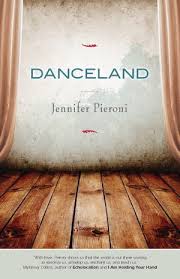150 pages, $18.95
Review by Jody Hobbs Hesler
Spare, poetic, and strange, Jennifer Pieroni’s novella, Danceland is the story of a child raised on fantasy in the wasteland of a former town. As Lettie understands it, “Their rickety cottage, its shingles loose, was all that was left of Danceland. They were Danceland’s survivors.” By day, Lettie and her father, Frank lead a life of simple sustenance. He goes off to work as a tree trimmer, and she helps with chores, such as carrying wood for their fires in bundles as “wide as Lettie’s hug.” At night, she and Frank read old reviews of her mother’s performances. All Lettie seems to know of the world is the steady regularity of her father, “a frown sticking out of a plaid overcoat,” and the mystery of Danceland, where she believes her mother once danced and entertained all comers.
Why doesn’t Lettie remember Danceland when her mother was there? Her father invents the story of a fever: “‘Higher than natural. It changed your mind and took away your memory.’” Even while Lettie believes the fiction, she “wished things would come clear, but she knew she was lost when it came to what was real.”
Lettie’s curiosity about the world beyond their drab existence develops suddenly when she is twelve. Until then, “Lettie knew no fear. Then, one day, it came.” It seems to arise from her concern over the seizures their pet cat, Nosey begins to suffer. In reaction to Lettie’s desire to find someone to help their cat, her father declares, “‘Nobody knows anything.’” Perhaps the flimsiness of this response finally overtaxes Lettie’s coming-of-age intelligence.Whatever the impetus, her new determination leads her to “follow the first low-flying airplane” out of Danceland. Hiding from boys in the woods along her way, she falls and hurts herself. When they come to her aid, asking where she’s from, Lettie wonders, “How to answer? She’d already decided that the crooked, shingled cottage in the woods wasn’t home – not anymore at least.” So she tells them she’s lost.
In this instant, Lettie becomes a foundling child who must reckon with and redefine all the truths of her life. But Lettie already knows “she wouldn’t know real if she saw it,” so how will she discern the truth about Danceland? Had she and her father been its sole survivors? Had her mother danced there, entertaining everyone? Or was Danceland “a remote state-owned ghost town where no one would find them, where not even hikers were allowed except for a once-yearly Historical Society tour”?
As she begins the task of navigating a world filled with people and with contradictions of everything she had known before, Lettie must wonder if truth is always better than illusion. The reader wonders about a couple of things, too. For one, how had Frank’s secrecy endured so uninterrupted, through all of his daughter’s childhood illnesses and his own jobs that must have required his absence from home long before Lettie was old enough to manage on her own? As Lettie reckons with the truths behind her father’s fictions, we also wonder why he wove such an elaborate web of deception and desolation in the first place.
The ending of the novella resolves much of the latter question, and, overall, Danceland succeeds as a lyrical story of a girl’s triumph over virtual imprisonment by a misguided father.
***
Jody Hobbs Hesler’s work has appeared or is forthcoming in Steel Toe Review, Stealing Time: A Literary Magazine for Parents, Valpariaso Fiction Review, Prime Number, Pearl, Charlottesville Family Magazine, A Short Ride: Remembering Barry Hannah, regional prize anthologies and other journals. Visit jodyhobbshesler.com for more.
![[PANK]](https://pankmagazine.com/wp-content/themes/pank/assets/images/pank-logo-large.png)

